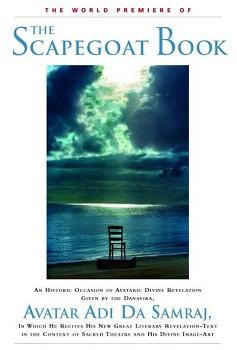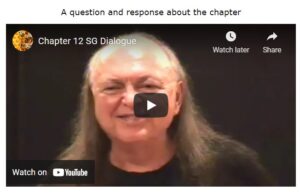
Chapter 12
The Great Fool’s Fear of Entombment,
and his Consequent Desire to Escape from Water

The Great Fool, Evelyn Disk, confined to his own massive embodiment by uninspected fears and fearful motivations, speaks more loudly now, in his final self-defense:
1. I tried me out on every remedy and prescription–each for a little while. Quickly–due to corpulence and wheeze–I experienced a fine intolerance for any remedial exercise, or Yogic program, of a physical kind. Then I went on to inner utterance–at first aloud, and, then, with “tongue in forehead”, so to speak–whereby, through prayers, or mantric speeches, up or down or merely to inside, I tried to re-communicate, by means of word-communion, with some kind of huger mind than mine. However, I found no larger mind around, and felt more excommunicated, if You will, than in communion with any talking- God–whose claim to be can never be believed, in any case, when, as it is, only perfect silence speaks to down from the vaguely blue and much polluted skies. Finally, I thought, and strained to sit in an, I thought, intelligent meditation– several times in the course of a week, for a good half hour at a time. Therefore, Sir, You see, I have been disciplined, and, altogether, reasonable with quest. However, all this traditional effort toward the “God” of popular convention only made me laugh and fart–and I found myself composing limericks in the meditation hall, with obscene rhymes and coarse puns about the sexual side of “religion”. In short, I gave it up! I had disproved the “virtues” of religious desire, and of all inward seeking for “What”, in any case, is not a “thing” inside. This done, I have now taken to Your wise advice–by relinquishing all the usual program of inner striving and good works, and, at last, by merely abiding firmly in my seat, established, by Your kind Word, in the certainty that only the true and very Self exists, and only “it” avails.
============================
Due to copyright limitations the remainder of Chapter 12 can not be continued.
Due to the protection provided by ‘Fair Use,’ the following comment by Adi Da Samraj, made after reading the Scapegoat Book to devotees, can be shared here for educational and commentary purposes. ‘Fair Use’ expressly permits, in specific circumstances, the use of copyrighted material for criticism, education, or commentary, ensuring the free exchange of ideas and insights. Therefore, to complete this Chapter 12 page, a question was raised by a devotee regarding Evelyn’s control over Raymond.
AVATAR ADI DA SAMRAJ: Umhm. And keep on sticking it to him …
DEVOTEE: Yes.
AVATAR ADI DA SAMRAJ: …the whole time.
DEVOTEE: Yes.
AVATAR ADI DA SAMRAJ: Battling with him. It is a disposition to absolutely suppress Raymond, defeat him. Whatever that takes, that’s in Evelyn’s disposition. Whatever it takes to make nothing out of Raymond is the entire purpose of Evelyn’s life.
DEVOTEE: Is that unconscious?
AVATAR ADI DA SAMRAJ: Well, it comes from a source that even exceeds and is beyond mere thinking about it. But of course there is much that he does intentionally and deliberately, and might have an argument for why that sounds like it has some virtue even or some intention or rightness or whatever.
But certainly all kinds of aspects of it are very intentionally done. And it is based on the denial of egoity while being the ego and arguing for it, even communicating arguments that sound like they are arguments against it, without he himself getting the point of the arguments, or grasping what it is that he’s really saying about it.
He is absolutely bound to this self-contraction, not the True and Very Self position, even though he claims it. He even claims it’s not a mere idea in his case, it’s just him, you see. He’s absolutely insane, insanely deluded, and all his aberrations are all over his body and his speech, in his state, in all that he does and says and so on in that room and all the situation that’s in that room because of him.
It’s part of the secret of The Mummery Book that part of Evelyn’s entire disposition is focused on defeating Raymond Darling. He has replaced him and never expected him to show up. He invented him in some sense. It seems like he just purely invented him and then he shows up at the window. He was anticipated, but never expected and is not wanted. There’s no room for him there….
You are Evelyn. You are not Raymond. You are ego, you are not the True and Very Self. That’s not an absolute, that’s simply the way it is in your state of life. Yes, the True and Very Self is the Truth. It is Consciousness Itself, but your ideas about it are illusions. It’s not true of you. It’s part of an image of self that you acquire by association with My Teaching and with Me here, and indulge in imaginations whereby you let yourselves off the hook of practice all the time—like Evelyn. Evelyn is constantly trying to talk himself out of the position of having to renounce—all the self-surrender and self-discipline stuff which he says has no market share….
So you could say perhaps better that Evelyn suffers from omniphobia—the fear of everything. Why just pick out death and blame it? He fears Raymond. He fears the True and Very Self. He fears the truth of it because of what it implies. So he pretends to have realized it and even be consoled by the message, you see, by the Teaching, but he isn’t. He is threatened to the core, to the root. It puts him in touch with his fear and with his clinging to the self-indulgent consolations of bodily existence and mentalizing existence.
So he’s just like all of you, just a regular guy, male or female, just every man, every woman, everybody. And everybody’s okay, as you say or think—As long as you can get away with it and then it’s not okay….
Anything else about it?
DEVOTEE: No, thank You, Beloved. Thank You.
Greek Theatre and Adi Da’s Revelation
“Our only real duty and purpose is to return far enough to the root of our civilization that we can remember—then help it remember—its sacred purpose and task.
And, naturally, the only question is how.”
Peter Kingsley, Catafque
***
THE ORPHEUM
The Tragic History of The Recent Return of Orpheus, or, The First Room In Three Books
BOOK ONE: THE MUMMERY BOOK
The Parable of Divine Tragedy, Told By Means of A Self-Illuminated Illustration of The Totality of Mind.
BOOK TWO: THE SCAPEGOAT BOOK
The Previously Secret Dialogue On The Avatarically Given Divine Way of Perfect-Knowledge-Only, Once-Spoken In A Single Night of Conversation, Between The Captive Divine Avatar and Great Sage, Raymond Darling, and His Captor, The Great Fool, and False Teacher, and Notoriously Eccentric Super-Criminal, Evelyn Disk—Herein Fully Given, Without Evelyn Disk’s Later and Famous and self-Serving Revisions, but Exactly As It Was Originally Tape-Recorded, by Evelyn Disk Himself, In The First Room, at the State Mental Facility, Near God’s End, and Presented in Exact Accordance With The Recent Revelatory and Complete Recounting, Given To The Waiting World of Intelligent and Receptive Persons, By Meridian Smith, Who Was, As Usual, Inexplicably Present.
BOOK THREE: THE HAPPENINE BOOK
The Childhood Teachings and The End-of-Childhood Revelations of The Famous “Infant Sage”, Raymond Darling— Compiled from Raymond Darling’s Original Handwritten Manuscripts, and Privately Held Tape-Recordings, Discovered in The First Room By His True Servant-Devotee, Meridian Smith, After The Miraculous Disappearance of The Avataric Great Sage.